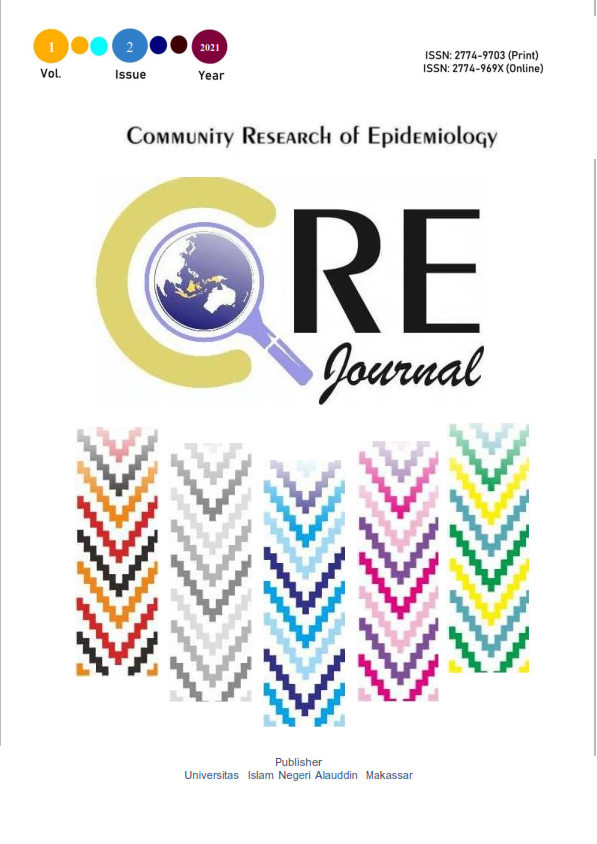Study of Exclusive Breastfeeding Behavior for Toddlers aged 7-24 months
Abstract
The target of at least 80% coverage of exclusive breastfeeding for infants aged 0-6 months is still difficult to achieve. This causes exclusive breastfeeding tends to decrease from year to year. This study aims to determine the behavior of exclusive breastfeeding in the working area of the Jati Raya Community Health Center, Kendari City. The method used in this study is a qualitative phenomenological approach. The research was carried out in the working area of the Jati Raya Health Center. Research informants were mothers who had babies aged between 7-24 months and stakeholders of the Exclusive Breastfeeding program at the Jati Raya Health Center. The sampling technique was carried out by purposive sampling. Data collection was carried out through in-depth interviews. In-depth interviews were conducted with 6 informants consisting of 6 mothers who had babies aged 7-24 months and 2 stakeholders of the Exclusive Breastfeeding program. Data analysis using Content Analysis. The results showed that the mother's behavior in exclusive breastfeeding was quite good. This happens because of the many influencing factors including attitudes, subjective norms (health workers, family support), perceptions of control and good intentions of mothers in giving exclusive breastfeeding to their babies. Conclusion: Attitudes, subjective norms and perceptions of behavioral control are collectively associated with behavioral intentions and intentions are direct antecedents of exclusive breastfeeding behavior. Suggestion: increasing the coverage of exclusive breastfeeding programs can be done by helping to improve positive attitudes, changing subjective norms to support exclusive breastfeeding, improving perceived behavioral control, and strengthening intentions to give exclusive breastfeeding
References
WHO (2013). Infant and Young Child Feeding Model Chapter for Textbooks for Medical Students and Allied Health Professionals. Switzerland
Suradi, R., Hegar, B., Pratiwi, I. G. A. N., Marzuki, N. S., & Ananta, Y. (2010). Indonesia menyusui.. Jakarta: IDAI.
UNICEF. (2013). Improving Child Nutrition. New York: Division of communication UNICEF
Peraturan Pemerintah Republik Indonesia Nomor 33 Tahun 2012 Tentang Pemberian Air Susu Ibu Eksklusif.
Menkes RI. (2004). Keputusan Menteri Kesehatan RI No.450/MENKES/IV/2004, Jakarta.
Kemenkes RI, 2017. Cakupan Pemberian ASI eksklusif di Indonesia.
Riskesdas. 2018. Cakupan pemberian ASI eksklusif di indonesia.
Kemenkes RI, 2015. Profil Kesehatan Indonesia.
Dinkes SULTRA. (2017). Profil kesehatan Sulawesi Tenggara. Kendari.
Dinkes Kota Kendari. (2017). Profil Kesehatan Kota Kendari.
Puskesmas Jati Raya. (2017). Profil Kesehatan Puskesmas Jati Raya. Kendari.
Nuary, F. (2010). Implementasi Theory of Planned Behavior Dalam Adopsi E- Commerce Oleh UKM. Jurusan Manajemen, Fakultas Ekonomi, Universitas Sebelas Maret.
Ibrahim, E. (2002). Analisis Faktor Determinan Pemberian ASI Eksklusif di Kabupaten Tangerang Propinsi Banten. Tesis. FKM UI, Depok.
Hartuti. (2006). Pemberian ASI eksklusif dan faktor-faktor yang berhubungan di Puskesmas Tarusan Kabupaten Pesisir Selatan Propinsi Sumatra Barat Tahun 2006. Universitas Indonesia, Depok Tesis. FKM UI.
Helmi, Maizu.(2010) Analisis Hubungan pengetahuan, Sikap ibu dan faktor lainnya terhadap pemberian ASI eksklusif pada bayi usia 612 bulan di wilayah kerja puskesmas IV koto kinali Pasaman Barat tahun 2010. Universitas Indonesia. Depok,. FKM UI
WHO. (2009). Exclusive breastfeeding http:///www.who.int/elena/titles/exclusive_breastfeeding/en/
Behera, B., Biswal, D., Uvanesh, K., Srivastava, A.K., Bhattacharya,M.K.,Paramanik,K..,(2015.)Modulating the properties of sunflower oil based novel emulgelsusing castor oil fatty acid ester: Prospects for topical antimicrobialdrug delivery. Colloids and Surfaces B: Biointerfaces, 155–164.
Mutuli LA, W. M. (2014). Appi-cability of theory of planned behavior in understanding breastfeeding inten-tion of postpartum women. Interna-Tional Journal of Multidisciplinary and Current Research, 2: 258-266.
Akour NA, Khassawneh MY, Khader YS, Ababneh AA, H. A. (2010). Factor affecting intention to breast-feed among syrian and jordanian mothers: a comparative cross-sectio-nal study. International Berastfeeding Journal, 5 (6): 1-8.
Hamilton K, Daniels L, White KM, M., & M, W. A. (2011). Predicting Mothers’ Decisions to Introduce Complementary Feeding at 6 Months. An Investigation Using an Extended Theory of Planned Behaviour. Appetite 56 (2011), 674–681.
Sutisna, E. (2017). Aplikasi theory of planned behavior pada perilaku pemberian asi eksklusif: studi kasus. Jurnal Kedokteran Yarsi, 25(2), 084-100.
Nuraini, T., Julia, M., & Dasuki, D. (2013). Sampel Susu Formula dan Praktik Pemberian Air Susu Ibu Eksklusif. Jurnal Kesehatan Masyarakat Nasional, 7(12), 551–556.
Wendiranti, C. I., Subagio, H. W., & Wijayanti, H. S. (2017). Faktor Resiko Kegagalan ASI Eksklusif. Journal Of Nutrition College, 6(Cdc).
Yuniyanti, Bekti, S. R. dan R. (2017). Efektivitas Kelompok Pendukung ASI ( KP-ASI ) Ekekslusif Terhadap Perilaku Pemberian ASI Eksklusif. Jurnal Ilmiah Bidan, II(1).
Wenas, W., Malonda, N. S., Bolang, A. S., & Kapantow, N. H. (2012). Hubungan antara pengetahuan dan sikap ibu menyusui dengan pemberian air susu ibu eksklusif di wilayah kerja puskesmas tompaso kecamatan tompaso. J. Kesehat. Masy. . https://fkm.unsrat.ac.id/wp-content/uploads/2012/10/Winly-Wenas.pdf
Baskoro, A. (2008). ASI Panduan Praktis Ibu Menyusui. Jogjakarta: Banyu Media.
Putri, R. S. (2010). Gambaran pengetahuan ibu tentang susu formula pada bayi 0-6 bulan di Puskesmas Sidomulyo. Tidak dipublikasikan: Karya Tulis Ilmiah Program Kebidanan Sekolah Tinggi Ilmu Kesehatan Payung Negeri.
Giles M, Connor S, McClenahan C, Mallett J, Stewart-Knox B, Wright M. (2007). Measuring Young People’s Attitude to Breasfeeding Using The Theory of Planned Behavior. Journal of Public Health. 29(1): 17-26.


